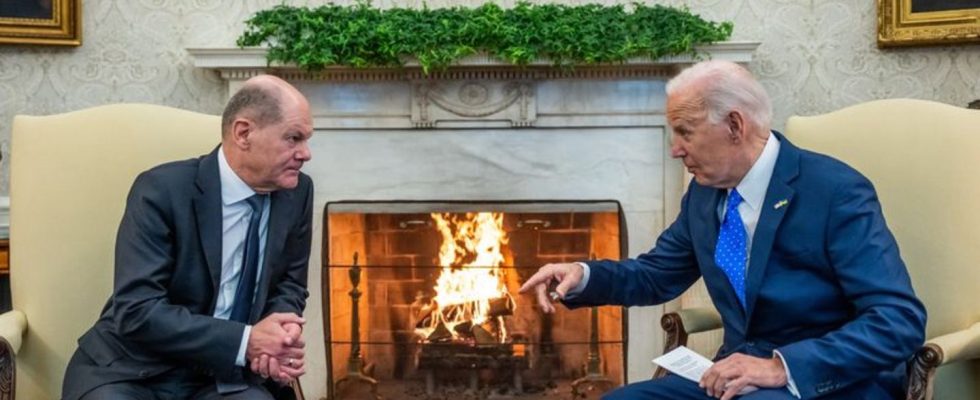There has been no new military aid for Kiev from the USA for weeks due to a domestic political blockade. Europe cannot absorb this. Chancellor Scholz and US President Biden are pushing.
The appeals are becoming more urgent: US President Joe Biden and Chancellor Olaf Scholz (SPD) have urgently warned against easing up on support for Ukraine.
Scholz said on Friday (local time) after a meeting with Biden in the White House in Washington that if it was not possible to get the US Congress to approve further funding for Kiev, the ability of the Ukrainian armed forces to defend their own country would be threatened to defend the Russian war of aggression. “We shouldn’t talk around it: support from the United States is essential to the question of whether Ukraine will be able to defend its own country.”
Biden, who has been trying for months to get billions in new aid through Parliament, warned that a failure by Congress to release it would amount to “criminal negligence.”
The problems of the largest arms suppliers
The USA and Germany are by far the most important arms suppliers for Ukraine in its defensive battle against Russia. Scholz estimates the value of the military equipment delivered and promised by Germany at more than 30 billion euros. The USA states the extent of its military aid at 44 billion US dollars (around 41 billion euros).
Both Scholz and Biden are currently struggling in different ways to maintain aid. At the beginning of the year, the Chancellor launched an initiative to encourage EU partners – especially economically strong ones such as France, Spain and Italy – to provide more support for the Ukrainian armed forces. The success so far has been moderate.
Biden, in turn, has been trying for months to get billions in new aid for Kiev through Congress. However, former President Donald Trump’s Republicans are blocking this. Recently, at least in the Senate, they have signaled some willingness to move. But a solution is still far from being in sight. On Thursday, a new legislative package that, among other things, provides $60 billion (56 billion euros) for Ukraine cleared its first formal hurdle in the Senate. Negotiations are still ongoing and a final vote in the Senate is pending. Whether the package will pass there – and above all whether it has a chance in the other chamber of parliament, the House of Representatives – is still completely open.
Given the months-long domestic political blockade in the USA, even minimal movements are currently seen as progress. Scholz also tried to exude confidence. After the conversation with Biden, the Chancellor said that he and the US President were both firmly convinced that new US aid must come, “but also confident that the American Congress will ultimately make such a decision.” He emphasized that this would also be the right message to Russian President Vladimir Putin: “That his hope is in vain, that he simply has to wait long enough for the willingness to support Ukraine’s friends in Europe and North America and elsewhere to wane.”
Biden praised Germany’s contribution. Addressing Scholz, he said: “You have done something that no one thought could succeed: you have doubled German military aid to Ukraine this year.” The USA now has to do its part.
The other crisis in the Middle East
During the conversation between the two in the Oval Office of the US government headquarters, which lasted about an hour and 45 minutes, Biden and Scholz also spoke about the crisis in the Middle East. The Chancellor then called on Israel to keep international law in mind during its military operation in the Gaza Strip. In response to a question about the preparation of a military operation ordered by Israel’s Prime Minister Benjamin Netanyahu in the city of Rafah on the border with Egypt, he said: “The type of warfare must comply with the demands that Israel has on itself, but that international law also entails are equivalent to.”
The White House said after the meeting that Biden and Scholz discussed “efforts to prevent regional escalation in the Middle East” and reiterated their commitment to Israel’s right to self-defense in accordance with international law. “They also underscored the need to protect civilians in the Gaza Strip and increase deliveries of life-saving humanitarian assistance.”
Offensive on Rafah
Netanyahu had recently ordered the army to prepare the offensive on Rafah. “It is impossible to achieve the war goal of eliminating Hamas if four Hamas battalions remain in Rafah,” he said through his office on Friday. The plans that the military leadership should present to the government must also include the evacuation of civilians in Rafah, the statement said.
A military offensive in Rafah, which lies in the very south of the Gaza Strip and borders Egypt, is considered highly problematic. The town, which had around 300,000 inhabitants before the war, is now said to be home to 1.3 million people. Most of them fled there from other parts of the Gaza Strip before the war, partly on orders from the Israeli military.
Biden and his Secretary of State Antony Blinken had also recently taken an increasingly clear tone towards Israel and urged the leadership there to do more to protect civilians in the Gaza war. The high number of civilian casualties in the Gaza war and the humanitarian catastrophe for the Palestinian civilian population caused by the conflict have triggered sharp international criticism of Israel’s actions.
On October 7th, terrorists on behalf of Hamas carried out a devastating massacre in Israel, especially against civilians. Since then, Israel has been waging war against the Islamist Hamas in the Gaza Strip.

